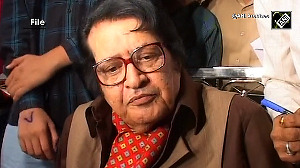The Supreme Court on Thursday slapped a fine of Rs 5 lakh on a former Samajwadi Party Member of Legislative Assembly, while dismissing his petition against Rahul Gandhi, in which he had alleged that the Congress leader had forcibly confined a girl in Uttar Pradesh.
"The allegation is without substance and without an iota of evidence," a bench of justices B S Chauhan and Swatanter Kumar said.
"The reputation of respondent no 6 (Rahul Gandhi) has been damaged by the undesirable act of the petitioner (former Samajwadi Party MLA Kishore Samrite)," the bench said.
The apex court further said the petition filed against Gandhi was "misconceived" and that Samrite abused the process of law on the basis of incorrect statement.
The bench passed the order on an appeal filed by Samrite, challenging an order of the Allahabad high court, which had dismissed his plea against Gandhi and imposed a cost of Rs 50 lakh on him for filing a frivolous petition. The high court had also directed a CBI probe against the former SP MLA from Madhya Pradesh.
Samrite had then approached the apex court against the high court's order.
Rejecting his plea, the Supreme Court said, "the petition filed by him was not bona fide" and there was no case of illegal confinement as the girl, who was allegedly kidnapped, ad made no complaint.
The bench said that the cost imposed by the high court was exorbitant and reduced it.
It said that the CBI will continue with its probe against Samrite and other persons who were involved in filing of the frivolous petition and asked it to submit a report within six months.
On October 1, the apex court had reserved its order on the plea challenging the March 7, 2011 order of the Allahabad high court.
Samrite, who is facing a probe by the Central Bureau of Investigation for dragging Gandhi's name in the case, had submitted in his plea that the high court had wrongly dismissed his petition by imposing exemplary costs of Rs 50 lakh.
He had insisted that his petition was maintainable and that the division bench of the high court exceeded its jurisdiction by transferring the matter from a single bench to itself.
He had submitted before the apex court that the high court had erroneously tagged his petition with another and had deprived him of his right to be heard. He had said the two petitions were different in nature and the names of persons in illegal confinement mentioned in them were different.
He had said the three persons -- the girl and her parents produced before the high court, were different from those mentioned in his petition.
The CBI had told the apex court that its probe has found that the case against Gandhi was based on "non-existent" claims.
Gandhi's counsel had argued that Samrite's petition was politically motivated to tarnish the image of the young politician.
He had also raised objections to the averments made by Samrite in his affidavit, saying nobody can accuse the judges of being biased.
Samrite had said that the CBI did not follow the proper procedure in probing the case and had registered the regular case without making a preliminary inquiry.









 © 2025
© 2025